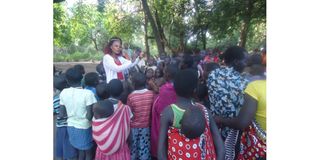They are thirsty for education, but there are no ECDE classes and teachers

Volunteer teacher Irene Serelwa with young learners at Ombolion area along the West Pokot and Turkana border.
What you need to know:
- Many parents in pastoralist communities, have embraced education.
- Education stakeholders feel ECDE in marginalised areas is underfunded.
- MP says mobile schools could be part of the solution to the problem in remote pastoral areas.
The national and county governments have been faulted for neglecting early childhood development education (ECDE) in pastoral areas, with stakeholders and leaders now demanding that counties in the North Rift build more pre-primary centres.
Thousands of children in the region who have reached school age stay at home because of the lack of the ECDE centres and long distances to available ones, particularly on the boundaries of West Pokot, Turkana, Elgeyo Marakwet and Baringo and near the border with Uganda.
The areas lack such education facilities because of insecurity.
The situation has resulted in desperate measures, with older children often carrying their siblings on their backs and walking long distances to school.
Devolved function
Early childhood education is a devolved function, and counties are required by the Constitution to build centres closer to the people so as to prepare children for primary school.
The Kenya National Union of Teachers (Knut) has raised concern over the situation in the region, citing funding constraints.
Union officials have called on the national and county governments to significantly increase the budget for early childhood education, especially in marginalised counties.
Mr Martin Sembelo, a Knut executive member representing the Rift Valley region, said early childhood education should be prioritised especially in disadvantaged communities.
Inadequate funding
He said money set aside by county governments for ECDE centres is inadequate.
Ms Irene Serelwa, a volunteer teacher who moves from one village to another teaching children, said even though she conducts lessons under trees, children have shown their interest in the classes and always show up.
“These villages along the border have many children who are thirsty for education but there are no schools and teachers,” she said.
Speaking in his Kapenguria office, Mr Sembelo, the West Pokot Knut secretary, said about 1,000 school-age children in the area stay at home because there are no schools.
“The area requires urgent ECDE centres as it used to experience frequent cattle rustling as well as border disputes between the Pokot and Turkana communities, but now there is peace and all is calm,” he said.
Many parents in pastoralist communities, he said, had embraced education and the number of children joining school has risen and hence the need to improve ECDE infrastructure.
"We need to see more involvement from the private sector, but we also need to see the government increasing its budget for this, particularly in the North Rift region," he said.
“We are clear about what needs to be done and we need to make sure we allocate the resources for these to really happen.”
Mobile schools
Kacheliba MP Mark Lomunokol suggested that the county and national governments create mobile schools in remote pastoral areas as one solution to the problem.
“This will be an avenue for children to attend evening classes after helping parents during daytime. Already, many people who missed out on education have embraced adult education. We want to catch up with other areas in terms of development,” he said.
He called on the government to help build temporary structures and provide other learning materials.
“We have hundreds of children who are supposed to attend ECDE (classes) but can’t because there are no teachers. There is a stereotype that pastoral communities don’t like education, but it is their way of life that forces them to stay that way,” he said.




